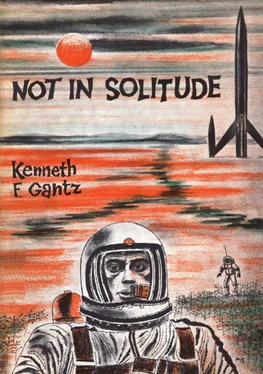“Don’t be a damn fool,” Dane told him. “I think maybe I do know something about what’s the matter with it. But if I’m right, Vining didn’t do anything to keep the drive from working. And neither did I.”
“A few days ago there was a pretty big think that maybe you did.”
Dane went over to the photo plane table. “You think I want to rot here anymore than you do? Take a look at this,” he added conversationally. He was not surprised.
The message stood forth again. One arrives at spacecraft. Death to men . He read it off. “I think I’ve got the answer to that too.”
Yudin grabbed up the phone and spoke rapidly. After a moment he stopped and listened. When he had hung up, he looked quizzically at Dane. “He says your ideas are probably as good as anybody’s. That was Colonel Cragg himself,” he explained. “He wants you to come down.” He went over to the chart table and sat down. “The Old Man must really be stumped.”
“Command post?” Dane was already on his way.
“Yeah,” Yudin said.
CRAGG SWUNG the wheel chair around sharply. “So now you’re ready to talk.”
“I’m pretty sure about the Martians,” Dane said. “And I’ve got an idea that may work to get us away.”
The hard eyes did not deviate. “So it’s still Martians. We have Martians in the drive, you think?”
“I think,” Dane said. “I think the messages we have been receiving are genuine, so I think we have Martians right here at the spacecraft. Just as they say they are. I also think they are preventing us from a take-off.”
“Just a minute.” Cragg rolled his wheel chair to the bench and toggled a switch. “I want to record this.”
“Suit yourself,” Dane said. “Maybe I’m wrong and maybe I’m right, but it won’t cost you anything to try out my idea.”
At least Lieutenant McDonald and Sergeant Peeney were all attention, their headsets cocked up off one ear. “For days now we’ve received messages. The evidence is unescapable that there is knowledgeable life on Mars. Unless we go back to your Tong Asia theory. Then what are the Martians? Where are they?”
“Reasonable questions,” Cragg dug at him. “Now are we to understand that you’re going to tell us?”
“I may be,” Dane said. “We have discovered only one form of life. As far as we have been able to investigate, we have entered an antiseptic world. Nothing lives in it except lichens. Why?”
“An equally obvious question would be why don’t you come to the point?”
“For the sake of making your recording complete, let’s add one more preliminary. The reason is that one form of life is so completely dominant that it has been able to exterminate any other life.”
“If you mean the lichens,” Cragg said, “what about your Martians? How come they were able to live?”
“Now I come to my point,” Dane answered. “My first point. The answer is, the lichens are the Martians.”
For a minute they were still; then Colonel Cragg grunted. He looked with mock patience at Lieutenant McDonald. “Complete with equipment to broadcast television messages, I suppose. Lichens!” he burst out.
“Excuse me, sir,” McDonald interrupted. He pushed his headset up from his other ear. “Captain Finerty reports that the burning party is ready to go out.”
“Hold it!” Dane exclaimed. “If you please,” he added, not wanting to add to the man’s temper. “The lichens will kill them. Like last night. At least let me say what I’ve got to say.”
McDonald looked at the colonel. Cragg chewed at his lip but he nodded.
This man is not stupid at all, Dane thought suddenly. He’s not missing any bet. “Supposing,” he said, “the lichens might not only be individual plants but could also be, each one of them, members of a colony of plants made up of a lot of lichens that function as a whole, as one big plant. As an entity, I mean. We have colony plants like that on Earth among the lowest forms. In a college botany course I took in algae and fungi we made drawings of them under the microscope. I’ve always remembered one in particular called Volvox. The name reminded me of the vox humana stop, and I’ve never liked pipe-organ music.”
Cragg hitched around to another position in his confining chair. “You’re doing one helluva lot of talking, as usual. Without showing me anything. How about let’s skip the biographical details? They’re not very fascinating. Then you can get down to the point. I suppose you’re going toward one. How come I’m always telling you to get to the point? You ought to talk less and say more. That goes for your writing too,” he added. “In plain English, how in hell could lichens be Martians and send messages over the radar? That’s what you said. That’s what we’re waiting to hear about.”
It wasn’t any time to get sore. Even to point out that that monologue itself was quite a speech for a man who admired brevity. “Volvox,” Dane said, “is a hollow microscopic globe made up of thousands of independent one-celled plants connected by strands of cytoplasm, so that the colony functions like a multicellular individual instead of a mere physical aggregate. It reproduces as an individual to form new colonies. Forms eggs inside the colony, so to speak. What if the lichen plants here on Mars are formed into colonies something on the same order, individual plants linking themselves together to form a superindividual? Then what if the colonies have evolved intelligence, so that each colony is like a brain, one brain? Then each individual lichen plant in the colony might be the equivalent of one brain cell, or a cluster of brain cells. Just like the neurons and clusters in our own brains.”
“The spark fires!” Cragg exclaimed.
“Right,” Dane said. “The spark fires could very well be the discharges of mental action, just like the electrical currents in our own brains, only on a very large and powerful scale. Assume that the lichen colonies cover a large area and are all brain, then the network patches of spark fire are mighty suggestive to me of neural patterns, with the big bolts to connect them in larger associations, just as in human conscious thought.”
“Now I’m damned!” McDonald gulped. “If you’ll excuse me, sir.”
“You and I both, Lieutenant,” Cragg told him.
“It has to be right,” Dane said. “By two or three hours after sunset the lichens are cold frozen. The spark fires die down and disappear. In the morning the plants warm up, and metabolism gets under way, and we get messages, starting about ten o’clock. By then they’re warm enough to think. You remember how the patterns of the fires built up around Dr. Pembroke’s scout and how they focused on the spacecraft. How they are aware of us I don’t know. Maybe by projecting electromagnetic radiation and receiving reflections that are cast back. As we do with radar. Maybe that’s the way they communicate with us. One thing for sure, they can concentrate their mental electricity, assuming I’m right, and project it beyond themselves. The way they did at us last night. It all adds up,” he urged. “The messages say the Martians are coming. Then the lichens grow out and surround us. We haven’t found any other life here. Maybe long ago they did away with all other life. Now they can’t endure the thought of any life but their own. Maybe the very idea of another life horrifies them and shocks them. Maybe it frightens them. As we would be frightened by, say, the ants mutating into an intelligence like our own, but with mores descended from the folkways of ants. It adds up. They have covered Mars themselves, in a moral solitude of identical life. Now we come. A different life. Therefore evil. So they will destroy us. If they can.”
Читать дальше












